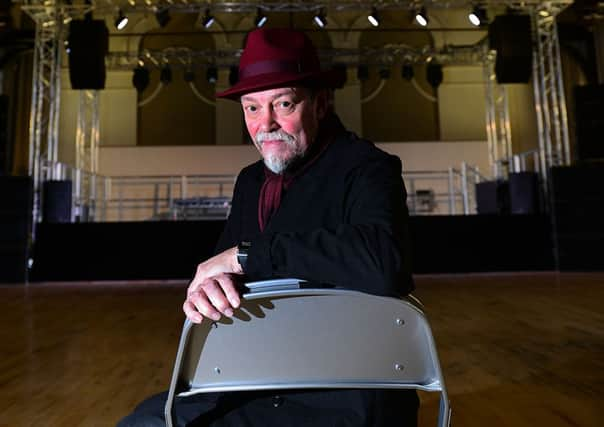Bill Nelson - why deafness won’t stop me playing music


WHEN BILL Nelson returned to Unity Hall, the newly-refurbished music venue in his home-town of Wakefield, this week, it wasn’t to perform, but to accept an honour bestowed upon the best his city has to offer.
Sadly, Bill may never perform at the venue, now known as Unity Works, after waking up deaf in one ear just two months ago. But as he accepted his Wakefield Star earlier this week, he told The Yorkshire Post that while the tinnitus that accompanies his deafness may have temporarily put a stop to live performances, it won’t stop him recording.
Advertisement
Hide AdAdvertisement
Hide AdBill, who is best known for fronting the 1970s band Be-Bop Deluxe, has recorded more than 100 albums, and continues to record at the studio at his home, near York, most days.
“I’m not completely deaf, but in mono, with a whistling accompaniment,” he jokes. “But it has made a lot of difference to my performance.”
It will be crushing news to his legion of “loyal” fans, some of whom travel from as far as Japan or America for his solo gigs. Although he’s been selective in recent years over his solo gigs, he was still regularly appearing at Leeds College of Music and at an annual fan convention.
Last September, Bill performed a fundraising gig at The Hepworth Wakefield’s Calder gallery to raise funds for the PA and lighting system at Unity Works, which was attended by three fans who flew in especially from the States.
Advertisement
Hide AdAdvertisement
Hide AdAlthough he visited the venue during the major development works, Monday’s ceremony was the first time he’d been back in Unity Works since it opened after the £4m redevelopment last month.
“There’s quite a family history with the place. My father was alto-saxophonist with various bands in the 40s and 50s, and played Unity Hall is his day. The only time I can remember seeing him perform was in the Minor Hall at a silver wedding party. I must’ve been four years old,” Bill said. “I’ve got very nostalgic memories of this place.”
In the 1960s, when he was playing the working men’s club circuit. Bill himself would play the Minor Hall, before later playing the main auditorium with Be-Bop Deluxe in the 1970s.
He also remembers shopping in the “swish” Co-operative department store at Unity Hall as a child, and has high hopes the venue will play a major role in a general resurgence in live music in the city.
Advertisement
Hide AdAdvertisement
Hide Ad“As a venue it’s great. In the 80s I watched lots of post-punk bands there, like The Skids, perform there. If they can make it as good as they’ve been planning, Unity Works will attract some serious acts to Wakefield,” he said.
Bill joins an illustrious list to be recognised with a star in Wakefield’s very own walk of fame.
He follows the likes of artists Barbara Hepworth and Henry Moore, rock band The Cribs and playwright John Godber, and says despite no longer living in the city, he still has a strong connection with the city.
“I’ve had a career in music for more than 40 years. I’ve travelled the world performing, but I’ve never left Yorkshire,” Bill said. “My mother still lives in Wakefield and I go through every weekend to help her with her shopping. I’ve never abandoned it, spiritually or emotionally. Growing up here in the 1950s and 1960s was a magical time for me.”
Advertisement
Hide AdAdvertisement
Hide AdEduated at Wakefield College of Art, he cited his early influences as filmmaker maker Jean Cocteau and guitarist Duane Eddy and even if his hearing condition, which will be helped by the fitting of a hearing aid, puts an end to his live shows, Bill, 65, remains determined to continue making music.
“I don’t know where the years have gone, my attitude is still the same as it was in my twenties,” he said.